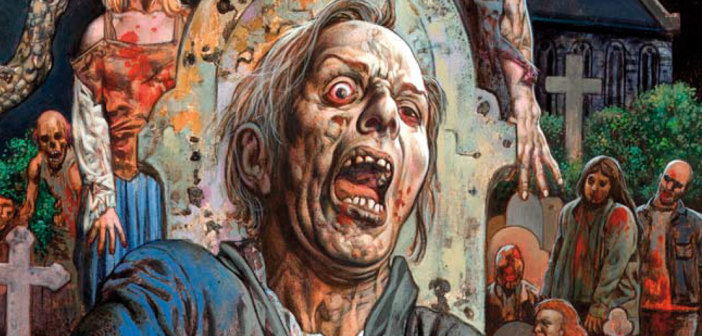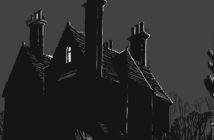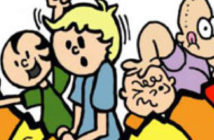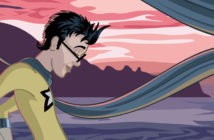The mass appeal of the zombie genre has always been a fad far beyond my understanding—perhaps it’s because of my venomous dislike for Zack Snyder’s film résumé. Try as I might, I don’t see the excitement in hordes of the rotting undead making every sluggish effort to destroy a clichéd crew of survivors holding up in attics and basements; of course, their supplies are dwindling and their mental states are declining. Why is it, then, that I enjoyed Berserker Comics’ Dead Kingdom of Flies?
I’m not familiar at all with zombie comics; I’ve successfully abstained from flipping through Robert Kirkman’s The Walking Dead, and there’s no intention at all to ever start reading it. Perhaps it’s this unspoiled mental landscape that was so receptive to the first trade volume of Dead Kingdom of Flies. It did, after all, deliver what I hoped it would: a simple and violent romp of disgusting zombies trying to convert the living. It’s a common (and possibly tired) formula, but here, writer Alan Grant and artist Simon Bisley deliver a story without any pretension—they’re not trying to upstage any material already piled up in the genre’s library. They just want to have some fun.
Writer Grant shows us Britain one week after it’s been devastated by a merciless plague of undeath and only a few handfuls of survivors are left. The origins of the plague are unknown, as is standard in this type of story, but Grant drops hints here and there for his readers to pick up on as to where the plague came from and why. I think I might have figured it out, but I’ll refrain from dropping any potential spoilers.
Our heroes are blue-collar firemen and military men; they’re holding themselves up in a fire hall while trying to devise a strategy for survival. It seems futile, but none of the survivors are ready to quit kicking. There are some unfortunate twists and turns, however, and corruption from within eventually takes root. Who can be trusted and who cannot?
It’s difficult to evaluate Grant’s writing. His style isn’t going to knock anyone over: it’s loaded with rough dialogue and jarring colloquialisms, but then again, this book isn’t an exercise in the literary merits of comics. It’s a zombie adventure, and on that level, Grant has established a solid foundation that communicates rather well his own personal spin on the undead genre, which is both coherent and entertaining.
A key strength of Dead Kingdom of Flies is its appearance—the trade looks fantastic. Grant guides the development of the comic, but the outstanding pencils of artist Simon Bisley and the bleak shades of colorist Adam Brown are what truly brings the book to life… or is it undeath? Throughout the trade, there are intensely violent full-page panels showing the carnage of the zombies and the savage survival of the humans. Violent imagery can be offsetting when it’s tossed around for shock value, but Grant, Bisley, and Brown are careful. Unlike films like Saw and Hostel, which are nothing but vulgar exercises in pornographic violence, the gore in this comic isn’t out of place—its fun, but it also demonstrates an interesting parallel between the survivors and the horrors of death they are staving off. After all, what is the zombie genre about if not trying to flee from the great equalizer?
I would be surprised if the artwork of Frank Miller wasn’t a source of inspiration for Brown; I couldn’t help by notice such influences in his character designs. There’s something identifiably unique about the way Brown illustrates the structure and details of the characters’ features (especially their lips) that struck me as direct similarities I’ve seen in The Dark Knight Returns and Sin City. There’s especially one character, a woman named Wendy, who looks like a tribute to one of Miller’s sassy dames. She even has a shower scene that is a clear tribute to Janet Leigh’s performance in Alfred Hitchcock’s 1960 thriller classic, Psycho.
Dead Kingdom of Flies won’t be winning any awards in the near future, but it’s certainly not a flunky venture, either. If anything, it softened me a bit to what zombies have to offer fiction, which I wasn’t sure was possible. When I wrapped up the first volume, I was genuinely curious what was going to happen next, and that’s the acid test for any story, isn’t it? If readers want to know what future books will reveal, then I’d say it’s a success.
This comic book review originally appeared on Broken Frontier on 10 February 2010.




